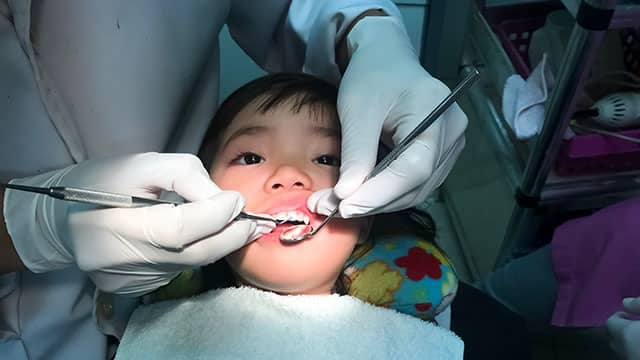-
-

FLUORIDE
What Is Stannous Fluoride Toothpaste?Discover what is Stannous Fluoride Toothpaste and its importance to prevent cavities and other oral health problems.

TEETH WHITENING
Whitening toothpaste - hydrogen peroxide vs. carbamide peroxideIf you lose one or more of your front teeth due to injury or decay, you may feel ...
-
Science & InnovationOral Health Commitment
- Oral Health Commitment
- Bright Smiles, Bright Futures
- Educational Resources
- Mobile Dental Van
- Volunteer
- ORAL HEALTH CHECK
- PRODUCT MATCH
- Oral Health and Dental Care | Colgate®
- Oral Health
- Hypercalcemia Teeth: What It Is & Treatment Options


Your body is a complex system with various components working together to keep it performing at its optimum best. The parathyroid hormone (PTH) helps maintain calcium and phosphorus metabolism. It has an important role in bone and teeth mineralization. But what happens if the parathyroid gland isn't working properly? Various conditions point to problems with the PTH, like hypercalcemia. Learn more about hypercalcemia, its effects on your oral health, and treatment options.
What Is Hypercalcemia?
Hypercalcemia is a condition marked by increased levels of calcium in the blood. The parathyroid gland regulates the calcium levels in your body by releasing parathyroid hormones (PTH). Issues with the parathyroid gland can cause an excessive release of the parathyroid hormone, also known as hyperparathyroidism (HPT). There are three types of hyperparathyroidism: primary, secondary, and tertiary. Primary hyperparathyroidism (PHPT) and cancer are the most common causes of hypercalcemia, accounting for over 80-90% of cases.
Hypercalcemia and Teeth
How does hypercalcemia affect your oral health? Calcium is one of the things your body needs to build strong, healthy teeth and bones. It also builds and maintains your jawbone, helping to create a solid anchor for your teeth. So what happens if you have too much calcium in the teeth? There are mild to severe oral symptoms that your dentist is specially trained to detect and treat. People with varying types of hyperparathyroidism and hypercalcemia may experience:
- Soft tissue calcifications
- Tooth sensitivity when biting and chewing
- Malocclusion
- Cavities
- Slight jaw pain
Treatment for Hypercalcemia
Your doctor will recommend a treatment option based on the severity and cause of the condition. According to the Cleveland Clinic, your doctor may suggest the following to moderate your calcium levels
- Drink more water: This will help flush out the excess calcium.
- Avoid calcium supplements.
- Avoid calcium-rich antacid tablets.
To ensure that your overall health is taken care of, your doctor will monitor and treat the underlying causes of hypercalcemia too.
A hormonal imbalance and some cancer and cancer treatments may lead to hypercalcemia. Fortunately, your dentist can detect and effectively treat oral issues due to these conditions. Talk to your doctor and dentist if you are experiencing discomfort in your teeth when chewing, pain in the jaw, or any other dental problems. They can help you take good care of your oral health while undergoing treatment.
This article is intended to promote understanding of and knowledge about general oral health topics. It is not intended to be a substitute for professional advice, diagnosis or treatment. Always seek the advice of your dentist or other qualified healthcare provider with any questions you may have regarding a medical condition or treatment.
Related Articles

Cancer
Excessive Saliva? What It Could Mean (and How to Deal)Excessive saliva could be a clue about the state of your overall health. Are there ways you can deal with this condition? Find out more, here.

Cancer
Is Dental Sedation Safe For Kids?Sedating a patient is normally a very safe procedure, and parents can help reduce the risks and stress level for their child before, during and after the treatment.

Cancer
How Long Does Novocaine Last?How long does novocaine last? Learn what anesthesia options are available for your dental treatment and how long the numbing effects will last.

Cancer
The 411 On Dental AnesthesiaWhen in surgery, some people suffer from dental anesthesia side effects. Learn more about anesthesia and why some patients don't respond as well to it.
Related Products

Colgate Total Active Prevention Whitening Toothbrush is a soft toothbrush with charcoal infused spiral and Floss-Tip bristles (1). This soft bristle toothbrush fights the root cause* of cavities, plaque, gingivitis, bad breath, tartar buildup**, and stains*** and also helps remove surface stains to prevent stain buildup.

Power away plaque with Colgate Total Battery Powered Toothbrush. This battery operated toothbrush for adults fights the root cause* of cavities, plaque, gingivitis, bad breath, tartar buildup**, and stains***. Plus, this battery toothbrush has a built in 2 minute timer and features two cleaning modes, Sensitive and Regular, to cater to your unique oral care needs.

The Colgate Total® Active Prevention Foaming Clean Soft Bristle Toothbrush is specially designed to tackle the root cause* of cavities, plaque, gingivitis, bad breath, tartar buildup**, and stains***.

Colgate Total Alcohol Free* Gum Health Mouthwash delivers 24-hour protection** against bacteria and also helps prevent gum problems

Helping dental professionals
More professionals across the world trust Colgate. Find resources, products, and information to give your patients a healthier future




